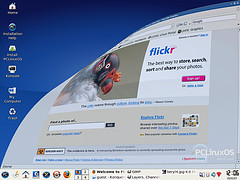Has Microsoft opened the door to the Linux desktop?

Microsoft has been going out of its way to tick off its partners.
First, Windows 8 has an interface, Metro, that only a mother could love. Metro will require Windows users to re-learn everything they know about how to use Windows. Then, Microsoft announced Surface, a vaporware tablet that leaves all its partners' Windows 8 tablet plans in disarray. , Finally, adding insult to injury, Microsoft stabbed its smartphone partners in the back by announcing Windows Phone 8, which made all currently shipping Windows phones obsolete. So, if you're in the PC business do you really want to work with Microsoft or is it finally time to look for a partner that really wants to work with you rather than use you?
I think it’s time for Dell, HP, Lenovo, and all the other big-time PC vendors to finally start taking the Linux desktop seriously. It’s clear that Microsoft’s agenda no longer is running in parallel with their plans.
Shifting to Linux won’t be easy. I’m sorry to say that in 2012 there are only two significant Linux desktop/tablet operating systems for original equipment manufacturer (OEM) to consider for partnering: Canonical of Ubuntu fame, and Google with Android and Chrome OS.
Ubuntu 12.04 vs. Windows 8: Five points of comparison
Yes there are many other Linux desktop distributions. Yes, some of them may be better. I, for example, favor Mint 13. But, Mint, while it finally has a partner shipping Linux Mint-powered PCs, and the other small Linux distributors aren’t big enough for the major OEMs to take seriously. The other big name Linux companies, Red Hat and SUSE, are now focused on servers.
Ubuntu, on the other hand, not only has been courting OEMs for years, it’s actually been shipping Ubuntu-powered laptops and desktops from companies like Dell for years. When Mark Shuttleworth, Canonical’s CEO, said recently that he expected 20-million PCs to ship this year with Ubuntu, he wasn’t blowing hot air.
Shuttleworth was, however, not talking just about the North American and European Union market, but the world market. It’s in China and India where Canonical, with its partner Dell have found that people really will buy PCs without Windows. I know for a fact that Canonical would be more than happy to work with other OEMs and bring the Ubuntu Linux desktop to Western markets.
Are you still under the delusion that Linux is too hard? That once people go Windows they won't look at anything else? Please, meet my now 80-year old mother-in-law who’s a happy Ubuntu 12.04 user.
The major OEMs already have experience in working with Google and Android. Since Android is the hottest selling smartphone operating system on the planet, Google must be doing something right. There's no reason Chrome OS-powered Chromebooks can't be the next step in desktop evolution.
Think about it. Chrome OS is just the popular Chrome Web browser running on Linux. If you know how to use a Web browser you can use a Chromebook. Unlike Windows 8’s Metro there is no learning curve what-so-ever.
Chrome OS’ big problem is that it requires an Internet connection to show its stuff. It is, after all, the first significant cloud-based desktop operating system. But, how much work can you get done now with your Windows PC without an Internet connection? If you’re honest you know that the answer is: “Not much.”
Besides, Chrome OS’ offline capabilities are improving. You can already use GMail off-line. It also looks like Google will be rolling out offline Google Docs for Chrome OS this week at their annual show of shows Google I/O.
Now, let’s take a long, hard look at the situation. Microsoft is showing itself to be no friend to its partners and Windows 8, like Vista before it, looks to be a flop in the making. But, if the hardware vendors start offering a Linux-based product lines they’ll increase their razor-thin margins, work with partners who want to work with them, and be able to offer customers attractive and secure operating systems that actually require less training than Windows 8 will.
Heck, thanks to Ballmer’s desktop and partner mis-steps maybe we finally will see a year of the Linux desktop after all!
Related Stories:
Hardware: the backlash to the backlash
Microsoft poisons its partners
Microflops: Microsoft Surface RT and 8 tablets
